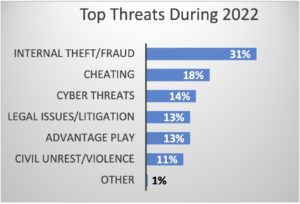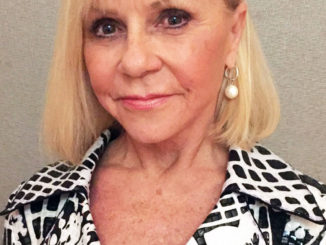The casino security and surveillance world is much different than it was even ten years ago, let alone 30. We just don’t worry about what we used to. I was speaking to a friend of mine, a security director, who said something that really got me thinking. He said, “I used to worry about a fire happening on the property, but now I worry more about what else may happen.” That made me think about what kinds of things we routinely discuss with new team members.
When I talk about the role of surveillance for the property during their orientation, it’s all about “see something, say something,” and how we are there to, along with security, protect them and our guests. Ten years ago, we never would have brought this up with team members because we didn’t want to scare them. Now, it’s commonplace and the team members listen!
Identifying the Issues
 Of course, the nature of the threats that our security and surveillance teams face has changed. It used to be emergencies such as a fire or medical issues, unruly guests, cheats, advantage players, and team member theft. Now, it’s all these things and more. Now, we have to also worry about active shooter scenarios, workplace violence, risk and liability, and Title 31, among others.
Of course, the nature of the threats that our security and surveillance teams face has changed. It used to be emergencies such as a fire or medical issues, unruly guests, cheats, advantage players, and team member theft. Now, it’s all these things and more. Now, we have to also worry about active shooter scenarios, workplace violence, risk and liability, and Title 31, among others.
The 2022 Casino Surveillance Survey reports that the top six threats for surveillance departments nationally and internationally are:
- Internal Theft and Fraud
- Cheating
- Cyber Threats,
- Legal Issues and Litigation
- Advantage Play
- Civil Unrest and Violence
As you can see, we are a far cry from the good old days of cheats, counters, and thieves.
Security teams are also becoming more focused on team member and guest safety, including the safety and protection of security officers, as well as liability issues. You can see this trend in the increased use of security body cameras and body armor by casino security teams. They are facing more volatile individuals and situations, and often do not know what to expect when they make their initial approach.
Additionally, it is becoming harder to find experienced or qualified security and surveillance personnel. Those officers, as well as the surveillance personnel providing video coverage of them, walking into those volatile situations may not have the level of training required to do so. As we all know, that is not a good recipe for success.
What Can We Do?
 Fortunately, we can address these issues successfully. I think the first thing we all need to realize is, the security needs of casinos and gaming resorts have changed forever. We must consider that the protection of the resort as a whole is necessary. We must think about an enterprise level of security that combines the efforts of both security and surveillance, risk management, and compliance.
Fortunately, we can address these issues successfully. I think the first thing we all need to realize is, the security needs of casinos and gaming resorts have changed forever. We must consider that the protection of the resort as a whole is necessary. We must think about an enterprise level of security that combines the efforts of both security and surveillance, risk management, and compliance.
Besides protecting the traditional casino, we should be thinking about and planning for:
- Protection of team members and guests from potential events and incidents
- Critical events and incidents, such as active shooter, workplace violence, etc.
- Regulatory compliance/fines, to include Title 31, and gaming regulations
- Liability concerns: guest and team member claims, slips/falls
- Monitoring and preparing for emerging threats and trends, such as civil disorder, epidemics, etc.
- Knowing who is on our properties and their activities – who are the individuals and/or groups who are likely to be an issue?
I think it’s important to note that we do most of these things now, but our primary emphasis is on reacting to issues and events rather than anticipating and preparing for them. When we are able to turn our strategic planning in that direction, we can ensure that we have a plan, people and resources in place when needed. For example, who was prepared for COVID-19? Probably no one. We certainly didn’t expect that it would become the pandemic it did. But now we know, and we should be prepared for something similar to occur.
Key Takeaways:
- Security Assessment – Typically, protecting your property at the necessary level these days begins with a security risk assessment to determine the threats facing you and where your vulnerabilities are (see ASIS General Security Risk Assessment Guideline for an example). If your own security team does not have the background, a professional security consultant can assist you with this.
- Understanding Your Threats and Vulnerabilities – This allows you to plan how to address possible threats and prepare for them. For example, knowing that there could be an active shooter or workplace violence incident on your property will help establish priorities for preparation, training, and implementation.
- Have an Emergency/Crisis Management Plan – Most of us have them, but they are usually out-of-date and may not even address today’s potential threats. The plan must be updated as often as possible and practiced through tabletop exercises and actual drills that include the executive team. Remember, it’s not enough to respond to the crisis; you must also minimize its impact to return to normal business as soon as possible. A well-rehearsed and thought-out plan will help you do so.
 Maintain Compliance with Title 31 – Fines like these can be millions of dollars! How are your compliance, security, and surveillance team members working together to prevent that from occurring? Plan ahead before it’s too late.
Maintain Compliance with Title 31 – Fines like these can be millions of dollars! How are your compliance, security, and surveillance team members working together to prevent that from occurring? Plan ahead before it’s too late.- Pay Attention to Your Liability Issues – Liability issues can be a significant problem and a serious drain on financial resources. The days of being able to just save a video of a slip and fall are over. Properties have saved time, money, and their reputations by investigating potential incidents and ascertaining all relevant information and facts of the case.
- Monitor Emerging Threats and Trends – If only we knew today what we know now about the pandemic! Of course, that really was a unique event and one that was out of control before we understood its short-term and long-term effects. However, we all learned, or should have learned, to pay much more attention to what is happening outside our casino property and how it could affect us.
- Know Your Players Through Technology – I don’t just mean in the Title 31 sense. We have all observed guests that steal, cheat, take advantage of our games, bring in prohibited weapons, fight, attack their spouse or partner, and the list goes on. As operators, we need to know when difficult or dangerous guests are trying to enter the property. Thankfully, technology is available to assist us with this critical mission.The use of license plate recognition, facial recognition, weapon detection, identification scanners, among other applications, are game changers for security and surveillance teams. When used properly, we know who is coming in and what their history is, allowing us to monitor their activity and respond as, or when, necessary. And when something does happen, we can usually identify who did it. The technology doesn’t sleep or get distracted, making it a consistent and effective component of your security plan.
- Train, Train, Train – You will never regret the training that you provide to your security and surveillance teams. They are your first responders and the better they are, the better you will be.
The key to today’s security programs is being purposely proactive about protecting your property. Relying on being reactive is just too late for the pace of what’s happening today.
See you at the Raving NEXT: Indian Gaming Strategic Operations & Leadership Conference in January!
Derk Boss is a Raving Partner and also Director of Surveillance for Angel of the Winds Casino Resort. Looking for more best practices for Surveillance and Security? Check out this session with Derk at Raving NEXT.




